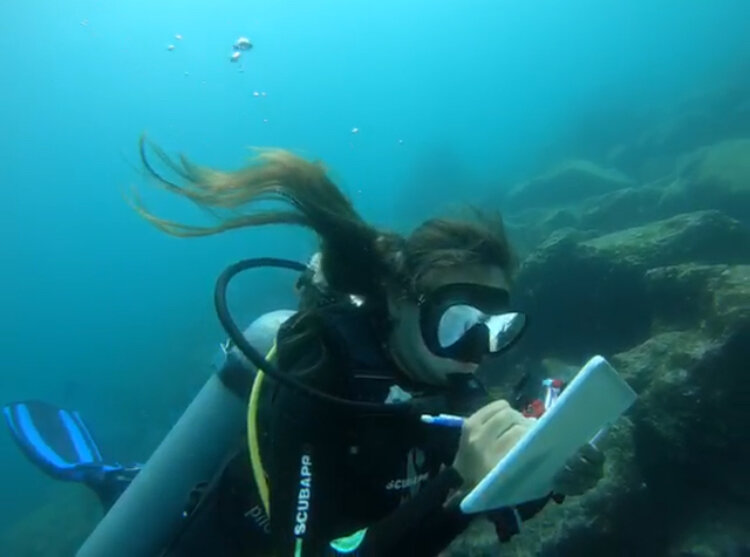Written by Kathryn Campbell
In fall 2019 I studied abroad in Ecuador and The Galápagos Islands. While I was there I took classes that all taught me a lot about environmental research, conservation, and management. I specifically focused myself on marine environments. Initially, I did this because I loved to scuba dive and wanted to learn more about how to conduct marine research. I’m a neuroscience major on the pre-health track, so I wasn’t educated much on climate change or conservation. Needless to say, I was surprised by how much the experience opened my eyes to the issues that our natural environments are facing, as well as the potential problems that could arise if humans don’t change their habits. I learned this step by step, and I’d like to share with everyone my experiences as vividly as I can in hopes that this may also impact their outlook on conservation.

To begin, I was completely overwhelmed by the beauty of the marine environments that we studied. I dived all along the coast of Ecuador, and then I moved to the Galápagos Islands where I dove at 3 different islands. Each habitat that I experienced offered a different kind of beauty – coral reefs teeming with reef fish, sandy bottoms with big sharks, cleaning stations with sea turtles, and so much more. However, it wasn’t necessarily seeing how beautiful the ocean was that caused me to start playing a more active role in conservation. It was seeing all of this beauty and comparing it to some of the dives that weren’t as beautiful. Some areas that we visited seemed so lifeless with bleached coral and an absence of the typical abundance of life that occupies coral reefs. It was sad to realize that all of the beauty that I experienced could be gone so quickly due to the ocean temperature rising just a couple degrees.

My first thought was, “What can I possibly do to prevent this? I’m just one person.”
And honestly, I was right.
One person can’t possibly save the world’s oceans, but at least by making small adjustments to my life I can reduce my negative contributions. If you’re wondering what you can do, the biggest thing is to reduce your carbon footprint by using less electricity, using public transportation, recycling or using sustainable items, etc.

The ocean is a huge sink for carbon dioxide, which is a gas released into the atmosphere by burning fossil fuels. Carbon dioxide increases temperatures as it accumulates in the atmosphere. If it wasn’t for the ocean absorbing all of this heat, land temperatures would be unbearable. However, the ocean takes a huge hit by even rising just one degree. It mostly affects the coral reefs, which are only 1% of the ocean floor, but they contain almost 25% of all ocean life. This is also the main source of food for many coastal populations. If the coral in the reefs can’t survive, the animals lose their habitat. This causes the animals to either die or migrate to another reef that is suitable for them. While this is obviously heartbreaking for the wildlife, this can cause huge threats to economies built on fishing and communities that rely on reef fish as a food source. This is all just a chain reaction that eventually leads to destruction for the wildlife and humans. Somewhere in this chain there has to be some sort of motivation for people to want to prevent this from happening – genuine concern for the animals, tourism, economy, quality of life. If we all have the mindset that our contribution matters, we can reduce carbon emissions enough to slow the rising ocean temperatures to a rate that the wildlife in the oceans are able to adapt to.

We need to prevent habitat loss!
When these reefs are gone, they are gone forever. If temperatures are going to rise inevitably, the least we can do is give the ecosystems time to adapt by slowing the rise. I genuinely encourage everyone to try to experience the ocean and appreciate its beauty by snorkeling or scuba diving. Once you realize how beautiful these ecosystems are and understand the complex dynamics by which they function, it really provides that extra perspective that motivates you to try to conserve these places. And this goes for not only the oceans, but all parts of the Earth. You don’t need to travel to exotic places. You can experience this in your own backyard just by taking a moment to sit outside and focus on the beauty in things that you may not have noticed before. Experiencing the Earth first-hand can’t be matched by any blog, video, picture, or speech. Education is just one part of conservation, experience is second.
Get out, get motivated, and start transitioning to a more conservative lifestyle.




